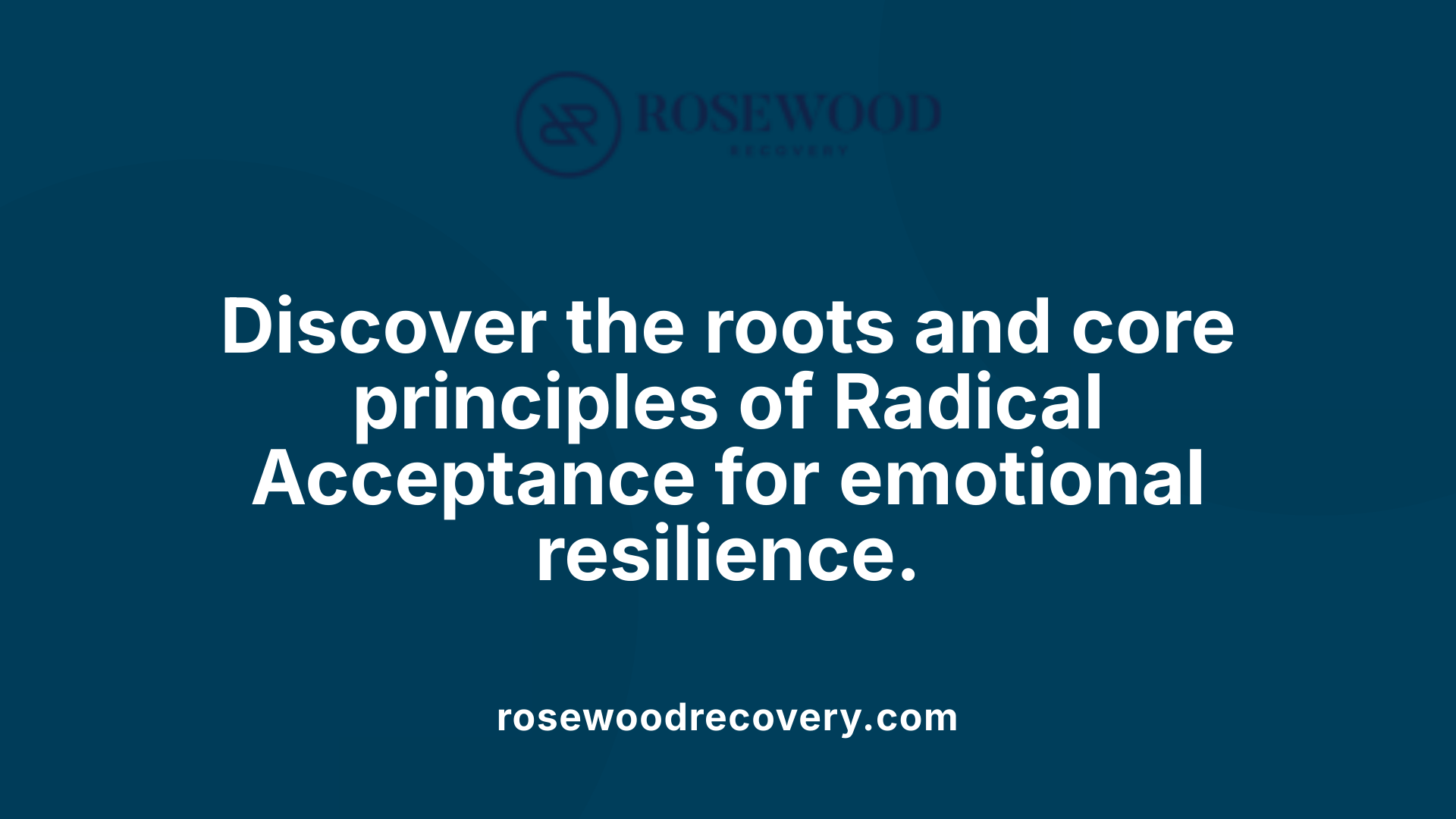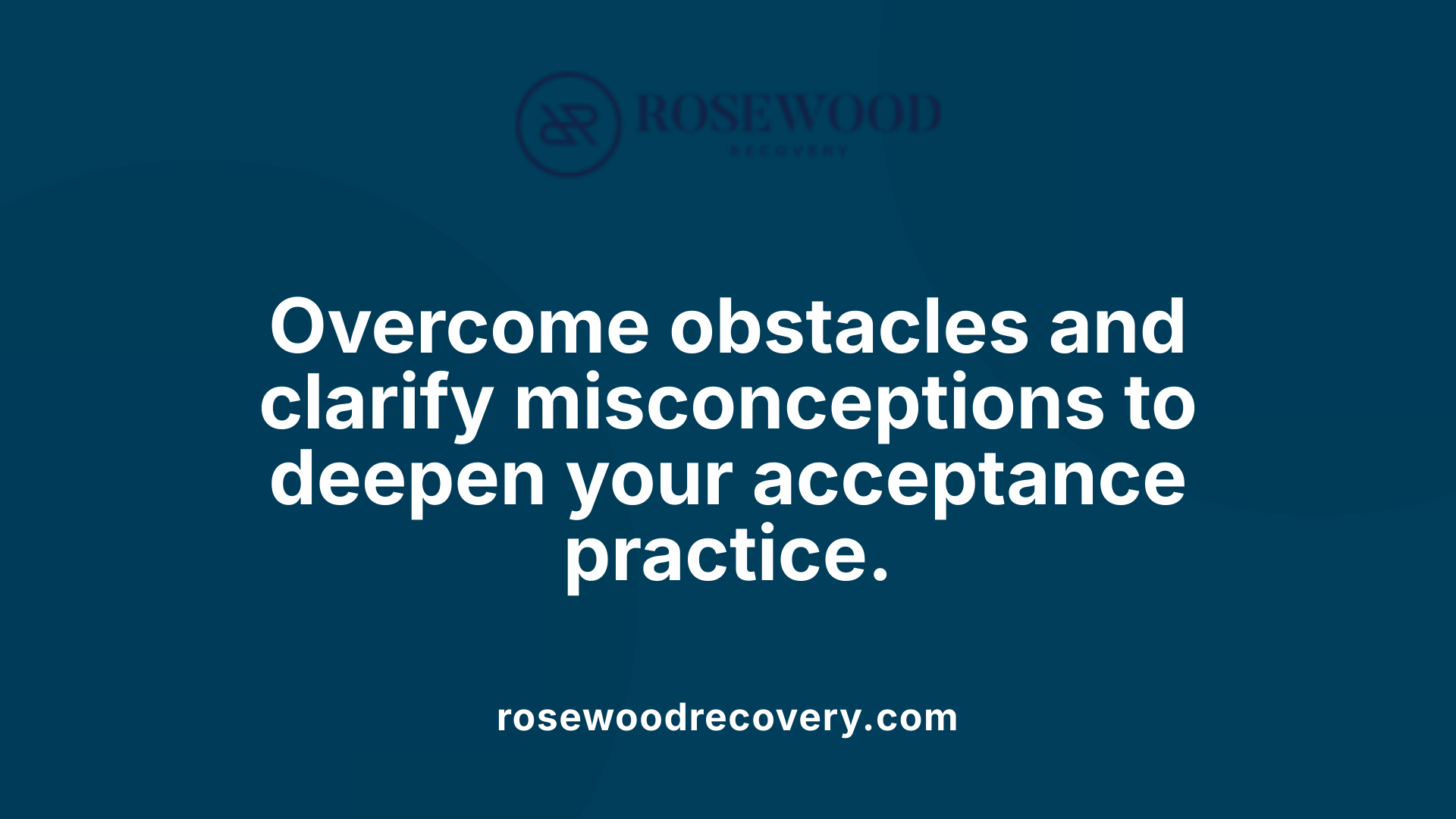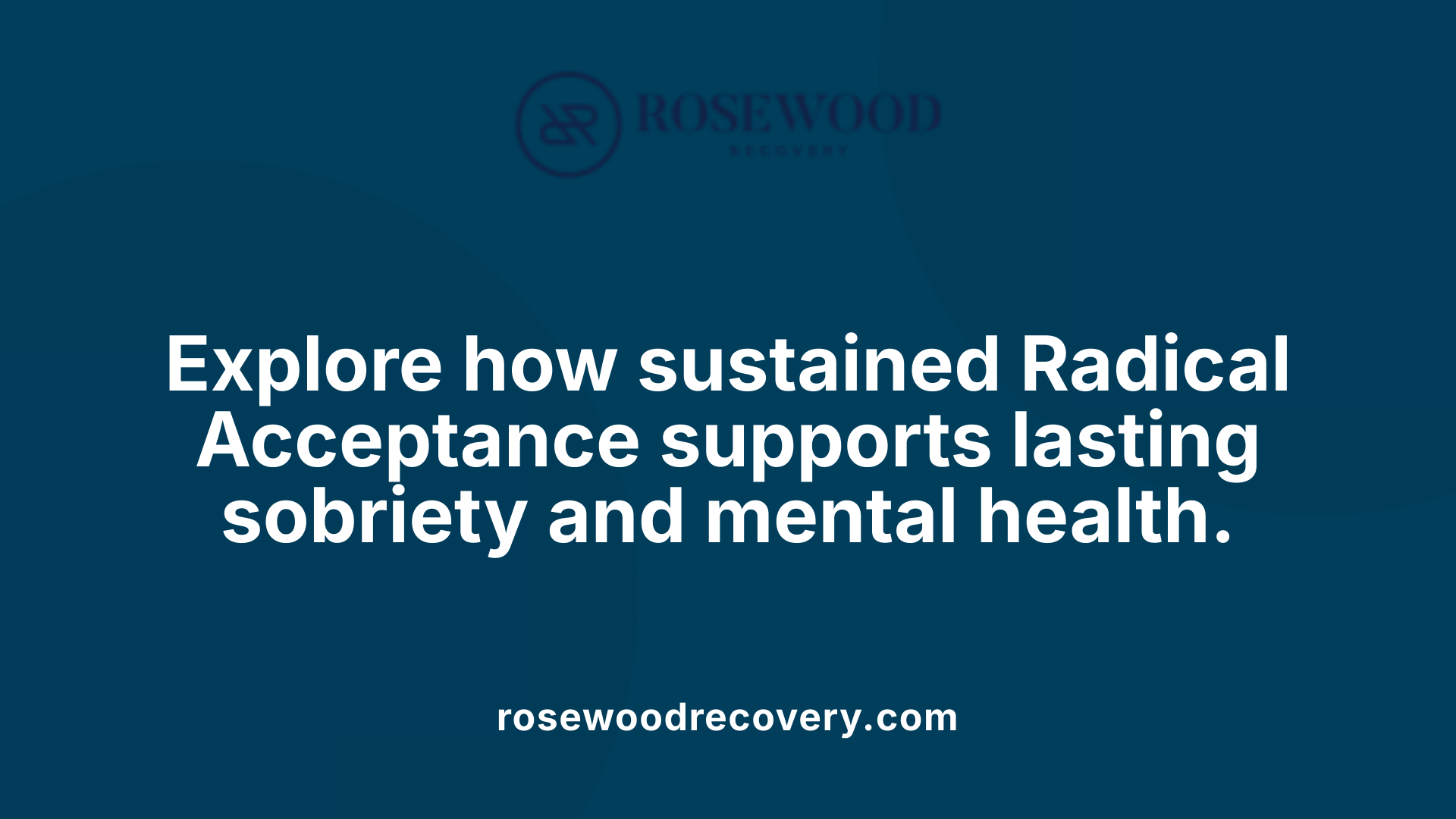Understanding Radical Acceptance in Recovery
Radical acceptance, a cornerstone technique of Dialectical Behavior Therapy (DBT), offers a transformative approach to addiction recovery by encouraging individuals to fully embrace their present realities, including painful truths, without judgment or resistance. This method reduces emotional suffering, enhances distress tolerance, and fosters resilience and self-compassion—key components in navigating the complexities of addiction and mental health challenges.
The Foundations of Comprehensive Addiction and Mental Health Treatment
What Are Comprehensive Treatment Services for Substance Abuse and Mental Health Issues?
Comprehensive treatment services address substance abuse and mental health issues through integrated, trauma-informed approaches tailored to each individual's needs. These approaches combine various levels of care and support to provide a seamless continuum for recovery.
Integrated Trauma-Informed Approaches
Trauma-informed care recognizes the profound impact trauma can have on addiction and mental health. Comprehensive services incorporate this understanding throughout treatment to create safe, supportive environments that reduce retraumatization and promote healing.
Components of Comprehensive Treatment
- Outpatient and Inpatient Programs: Offer flexible and intensive care settings depending on severity and need.
- Medication-Assisted Treatment (MAT): Utilizes medications alongside counseling to manage withdrawal and reduce relapse.
- Detoxification Services: Provide medical supervision during substance withdrawal to ensure safety.
- Residential and Recovery Residences: Ensure structured environments for sustained recovery.
Role of Counseling, Therapy, Psychiatric Care, and Post-Treatment Support
Counseling and therapy address psychological aspects of addiction and mental health, offering coping strategies and behavioral change techniques. Psychiatric care manages co-occurring mental disorders with medication and therapy. Post-treatment support such as peer groups, relapse prevention programs, and access to social services like housing and job training help maintain long-term recovery.
Facilitating Access and Continuity of Care
Comprehensive services include 24/7 screening, referral systems, updated treatment directories, and assistance with insurance coverage including Medicare. Crisis helplines and interventions like Naloxone availability aim to reduce overdose deaths, ensuring immediate and ongoing support.
Through this holistic framework, comprehensive treatment services empower individuals toward sustainable recovery and improved quality of life.
Key Therapeutic Approaches in Addiction Recovery Programs
What types of therapies are commonly used in addiction and mental health treatment?
Addiction recovery programs employ a variety of evidence-based therapies designed to address the psychological, behavioral, and social aspects of substance use disorders and co-occurring mental health issues.
Evidence-Based Therapies
- Cognitive-Behavioral Therapy (CBT): CBT is a fundamental approach that helps individuals recognize and change unhealthy thought patterns and behaviors. It promotes the development of effective coping skills to manage cravings and prevent relapse.
- Motivational Interviewing and Enhancement Techniques: These methods focus on increasing an individual's motivation to engage in treatment and make positive changes by exploring and resolving ambivalence about recovery.
- Family and Group Therapies: These therapies foster social support and address family dynamics and communication, which are critical for long-term recovery success.
Holistic Methods and Medication-Assisted Treatments
- Holistic Approaches: Complementary therapies such as yoga, meditation, art therapy, and animal-assisted interventions support emotional regulation, stress reduction, and overall well-being.
- Medication-Assisted Treatment (MAT): MAT is especially important for opioid and alcohol use disorders. It combines FDA-approved medications with counseling to reduce cravings, alleviate withdrawal symptoms, and improve treatment retention.
These therapies are often integrated within comprehensive care models, ensuring that treatment is tailored to the individual’s needs. The use of therapies like Dialectical Behavior Therapy (DBT), which includes techniques such as radical acceptance, can further enhance emotional resilience and coping in recovery.
| Therapy Type | Purpose | Description |
|---|---|---|
| Cognitive-Behavioral Therapy | Change negative thoughts and behaviors | Helps develop coping skills for managing triggers and cravings |
| Motivational Interviewing | Increase motivation for change | Explores ambivalence to foster commitment to recovery |
| Family and Group Therapy | Strengthen social support and communication | Addresses relational dynamics essential for sustained recovery |
| Holistic Therapies | Promote overall emotional and physical wellness | Includes yoga, meditation, art therapy, and animal-assisted therapy |
| Medication-Assisted Treatment | Reduce cravings and withdrawal symptoms | Uses medications combined with counseling for opioid and alcohol disorders |
Tailoring Treatment to Different Types of Addiction and Co-occurring Disorders
How do treatment programs address different forms of addiction?
Treatment programs customize interventions based on the specific type of addiction, whether it involves substances like opioids, alcohol, or behaviors such as gambling. To effectively tackle the multifaceted nature of addiction, programs combine various approaches including behavioral therapies and medication-assisted treatment (MAT).
Medications such as methadone, buprenorphine, and naltrexone are commonly used to manage the physical dependency aspects of addiction. These are integrated with counseling and therapeutic techniques, often drawing on Dialectical Behavior Therapy (DBT) principles like radical acceptance to improve emotional regulation and distress tolerance.
Different settings of care match the severity and individual needs of each person. These settings include inpatient facilities, residential programs, outpatient treatment, and partial hospitalization. This flexibility allows for a tailored approach that best supports recovery progression.
Mental health care is frequently integrated into addiction treatment to address co-occurring disorders like anxiety, depression, or borderline personality disorder. Family support and educational services ensure involvement of loved ones, which can improve treatment outcomes.
Post-treatment support is crucial for maintaining progress. Sober living environments provide a structured, supportive community, while mutual support groups such as Alcoholics Anonymous (AA) and Narcotics Anonymous (NA) offer ongoing peer connection and encouragement. These elements help sustain sobriety and promote long-term healing and resilience.
Understanding Radical Acceptance: Origins and Principles

What is Radical Acceptance and Who Introduced It?
Radical acceptance is a psychological technique rooted in Dialectical Behavior Therapy (DBT), which was developed by psychologist Marsha Linehan in the 1980s. It involves fully embracing the present moment—including painful or difficult realities—without trying to change, avoid, or deny them.
How Does Radical Acceptance Differ From Approval or Resignation?
It's important to clarify that radical acceptance does not mean approving of or resigning to a situation. Instead, it means recognizing facts as they are, without judgment or resistance. This acceptance creates mental space to respond effectively rather than reacting emotionally or engaging in denial.
How Does Radical Acceptance Reduce Suffering and Emotional Reactivity?
By accepting what is unchangeable, radical acceptance reduces unnecessary emotional suffering and reactivity. Rather than fighting reality or becoming overwhelmed by painful emotions, individuals develop distress tolerance and emotional resilience. This can lessen feelings of anger, denial, or helplessness.
What is the Connection Between Radical Acceptance and Other DBT Skills?
Radical acceptance is integral to several DBT skill sets, including mindfulness, distress tolerance, and emotion regulation. Mindfulness nurtures awareness of the present moment. Distress tolerance teaches managing uncomfortable feelings, while emotion regulation helps control intense emotions. Together, these skills support individuals in embracing reality compassionately and constructively.
Why is Radical Acceptance Important?
Through its emphasis on accepting the unchangeable, radical acceptance facilitates healing by freeing people from emotional suffering and denial. It empowers individuals to face reality with courage, fostering improved mental health and more fulfilling lives.
How to Practice Radical Acceptance in Addiction Recovery

Steps to Practice Radical Acceptance: Noticing Resistance and Acknowledging Reality
The process of radical acceptance begins with noticing any resistance to the current reality. This means becoming aware when the mind fights against what is happening, such as denial or anger about addiction or its consequences. Following this, the next step involves acknowledging the situation without judgment. Recognizing facts as they are—without labeling them as good or bad—allows one to reduce emotional suffering by not engaging in denial or avoidance.
Active Acceptance and Coping Statements
Active acceptance means intentionally embracing the reality of the situation, rather than simply resigning oneself to it passively. Using coping statements like "It is what it is" can help anchor this acceptance during moments of difficulty. These phrases serve as reminders to stop resisting and begin working with the present circumstances.
Embracing Self-Compassion
An important part of radical acceptance is treating oneself with kindness. Addiction recovery involves confronting painful truths, and self-compassion can soften the emotional impact. Recognizing that struggle is a shared human experience reduces shame and encourages ongoing healing.
Focusing on Effective Responses
Instead of avoidance or resistance, radical acceptance encourages shifting energy toward constructive actions. This might involve seeking support, practicing mindfulness, or utilizing DBT skills to manage distress. Focusing on what can be controlled—choices and behaviors—creates space for growth and resilience in recovery.
Common Challenges and Misconceptions in Practicing Radical Acceptance

What Are Common Obstacles to Radical Acceptance?
Practicing radical acceptance can be challenging due to several common obstacles. Many individuals confuse acceptance with approval, mistakenly thinking that accepting a situation means endorsing or agreeing with it. This misunderstanding often leads to fears of complacency, where people worry they might give up trying to improve their circumstances.
Intense, painful emotions such as anger, denial, or grief can also hinder acceptance. These feelings stir resistance, making it difficult to fully embrace reality without judgment. Additionally, perfectionistic thinking can create unrealistic expectations, causing frustration when acceptance does not immediately eliminate discomfort.
How Do Perfectionism and Lack of Self-Compassion Impact Practice?
Perfectionism often drives individuals to reject imperfect or painful realities, undermining radical acceptance. Coupled with a lack of self-compassion, this can fuel harsh self-criticism and emotional struggle. Embracing self-compassion is crucial, as it supports gentle acknowledgment of one’s feelings and limitations, easing the path toward acceptance.
How Can Acceptance Be Distinguished from Giving Up?
It is important to understand that acceptance is not synonymous with giving up or resignation. Radical acceptance involves recognizing and acknowledging reality as it is, without resistance or denial, but it does not mean endorsing or approving of the situation. This distinction empowers individuals to respond effectively rather than passively surrender to circumstances.
How Can Emotional Resistance to Reality Be Overcome?
Emotional resistance often stems from the painful feelings associated with reality rather than the facts themselves. Techniques like using coping statements — for example, "It is what it is" — can help reduce emotional reactivity and foster acceptance. Gradually practicing acknowledgment without judgment and cultivating self-compassion can reduce the instinct to fight or avoid painful truths, enabling better distress tolerance and emotional resilience.
Benefits of Long-Term Radical Acceptance Practice in Recovery

How does radical acceptance improve emotional resilience and distress tolerance?
Long-term practice of radical acceptance bolsters emotional resilience by teaching individuals to fully embrace the present moment without resistance. This skill enhances distress tolerance, enabling people to manage painful emotions without becoming overwhelmed. Over time, this reduces emotional reactivity and helps individuals respond thoughtfully rather than react impulsively.
In what way does radical acceptance reduce stress and unnecessary suffering?
By accepting reality as it is — without judgment or denial — radical acceptance alleviates the mental anguish that arises from fighting unchangeable situations. This acceptance allows individuals to release negative emotions like anger and frustration, significantly diminishing stress and the associated suffering.
How does radical acceptance lead to improved interpersonal relationships?
As emotional reactivity decreases, interpersonal effectiveness improves. Practicing radical acceptance encourages compassion towards oneself and others, fostering healthier communication and stronger connections. Letting go of resentment and blame paves the way for forgiveness and empathy.
What are the mental health benefits and effects on sustained sobriety linked to radical acceptance?
Radical acceptance supports better mental health by reducing symptoms of anxiety, depression, and suicidality often triggered by distress. It helps maintain sobriety by allowing individuals to confront the realities of addiction openly, reducing denial and shame. This mindfulness and emotional regulation underpin sustained recovery and overall wellbeing.
Overall, integrating radical acceptance into long-term recovery contributes to a more balanced emotional life, improved relationships, and a commitment to healing and sobriety.
Integrating Radical Acceptance into Holistic, Compassionate Care Models

How is radical acceptance incorporated within comprehensive treatment services?
Radical acceptance plays a vital role in comprehensive, holistic care models by encouraging individuals to fully embrace their current reality without judgment or resistance. This approach is especially integral in addiction treatment programs where it helps clients acknowledge their struggles without shame, reducing denial and promoting emotional resilience. Clinics like pH Wellness integrate radical acceptance within Dialectical Behavior Therapy (DBT), combining it with mindfulness, distress tolerance, and emotion regulation to support sustainable recovery.
What role does radical acceptance play in trauma processing and emotional healing?
In trauma recovery, radical acceptance facilitates healing by helping individuals release negative emotional attachments and feelings of unworthiness connected to past events. By acknowledging painful realities without attempting to change them, patients can experience emotional relief and reduced suffering. This acceptance creates mental space to process trauma constructively, lessening emotional reactivity and promoting self-compassion.
How are DBT techniques such as role-playing and real-life reflection used to support radical acceptance?
Various DBT strategies reinforce radical acceptance in therapy. Role-playing and reflection on real-life scenarios enable clients to practice embracing difficult emotions and situations in a controlled environment. These exercises build distress tolerance and prepare individuals to apply acceptance skills in daily life, enhancing their capacity to face challenges effectively. Integration of these techniques into broader treatment plans fosters resilience and improved interpersonal functioning.
How does radical acceptance promote self-acceptance and wellbeing beyond therapy sessions?
Radical acceptance extends beyond clinical settings, empowering individuals to cultivate ongoing self-compassion and emotional balance. By rejecting resistance to unchangeable circumstances, clients can alleviate unnecessary suffering and reduce emotional reactivity. This promotes wellbeing and has been linked to positive outcomes such as reduced stress, better relationships, and even improved weight-loss maintenance. The skill encourages a proactive stance toward life, helping individuals live more fulfilling, resilient lives.
Embracing Reality for Lasting Recovery
Radical acceptance is a powerful psychological tool that complements comprehensive addiction and mental health treatment by helping individuals face harsh realities with compassion and courage. By integrating this practice through Dialectical Behavior Therapy and holistic care models, those in recovery can reduce emotional suffering, increase resilience, and cultivate a sustainable path toward healing. Understanding and embracing radical acceptance transforms the recovery journey into one of empowerment and profound self-acceptance.
References
- DBT Skill Radical Acceptance: For Mental Health Healing
- The Practice of Radical Acceptance
- DBT Radical Acceptance: How DBT Helps You Heal ...
- How to Practice Radical Acceptance
- Therapy For Substance Abuse Treatment
- The Different Types of Drug Addiction Therapy
- Addiction Treatment Methods | Evidence-Based Practices




